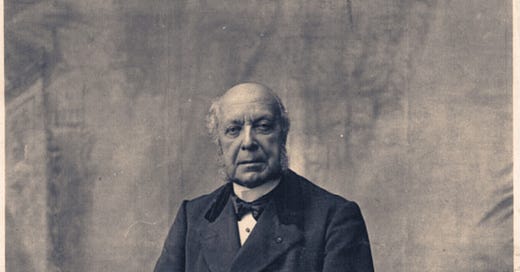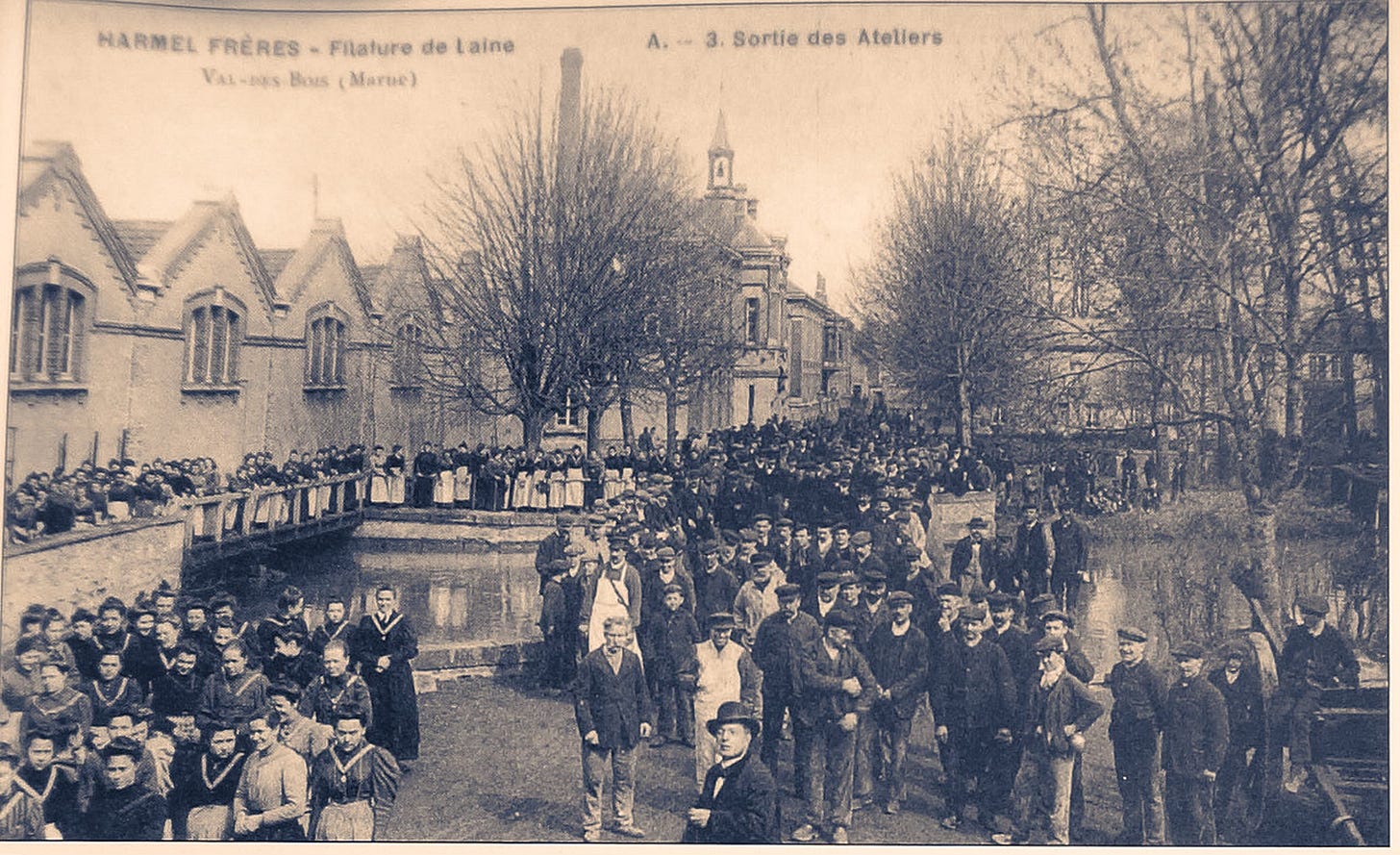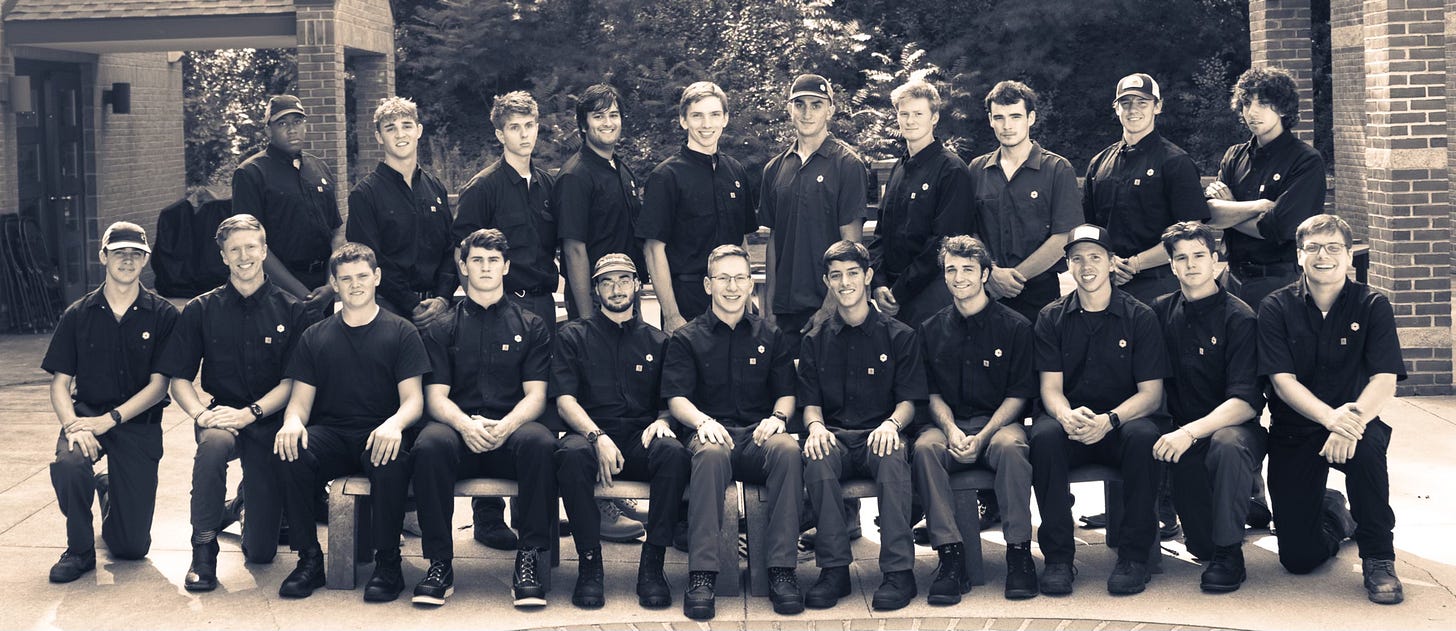Leon Harmel’s Intellectual Legacy and Influence
By Stephen J. Grabill, Ph.D Venturi Fellow, Harmel Academy of the Trades
Léon Harmel and Manuel d’une Corporation Chrétienne
Léon Harmel (1829–1915) was a Catholic industrialist whose approach to business and labor relations set a profound example for integrating faith with economic life. Born into a textile manufacturing family, Harmel inherited and transformed the Val-des-Bois factory near Rheims into a model of Christian social enterprise. He saw his role as an employer not merely in economic terms but as a steward of social and moral responsibilities.
A devout Catholic, Harmel sought to apply Catholic social teachings directly to the workplace. His landmark work, Manuel d’une Corporation Chrétienne, was published in 1874 as a guide for Christian employers and workers, outlining a cooperative economic model that integrated faith and labor. “The labor of man is not an object of barter, but a human act,” Harmel wrote, underscoring his belief that economic transactions must be subject to moral laws. By advocating for the dignity of work and the formation of Christian worker associations, Harmel provided a blueprint for Catholic business leaders seeking to create workplaces that aligned with Church teaching and Gospel values.
Léon Harmel and Rerum Novarum
Harmel’s efforts were instrumental in shaping Pope Leo XIII’s 1891 encyclical Rerum Novarum, which is regarded as the foundation of modern Catholic social teaching. Harmel was one of the key figures whose real-world applications of Catholic labor principles influenced the encyclical’s content. He organized pilgrimages of French workers to Rome over many years, one such pilgrimage during October and November 1889 brought nearly 15,000 Catholic workingmen for Leo XIII’s Jubilee, advocating directly to the Pope for the rights of laborers within a Christian framework.
In Rerum Novarum, Leo XIII affirmed many of Harmel’s principles, stating: “Capital cannot do without labor, nor labor without capital.” This mutual dependency reflected the labor policies that Harmel had implemented at Val-des-Bois, where he established workers’ councils and promoted cooperative decision-making. Harmel’s model of employer-employee collaboration demonstrated the feasibility of a third way—one that neither exploited workers nor sought to abolish private property but instead fostered cooperative business ethics grounded in Catholic social doctrine.
The Conscience of a Christian Social Order
Harmel’s life and work exemplify the concept of a Christian social order in which business is not merely a profit-driven enterprise but a vocation that serves both God and society. He believed that the fundamental unit of a just economic system was not the individual or the state but the family, and he sought to preserve the stability of working families through fair wages, social benefits, and moral formation.
One of his greatest contributions was the establishment of workers’ councils, which encouraged dialogue and collaboration between employers and employees. “To organize with wisdom and prudence, to govern with justice and charity” was Harmel’s guiding principle. These councils provided a forum for workers to discuss grievances, propose improvements, and contribute to decision-making processes. By fostering a spirit of cooperation, Harmel demonstrated that economic structures grounded in Christian ethics could enhance both productivity and social harmony.
Harmel’s initiatives also extended beyond the factory floor. He founded educational programs for workers and their families, ensuring that professional skills and moral instruction were interwoven. “The true employer is not a master but a father to his workers,” he stated, highlighting his commitment to the personal and professional development of his employees.
The Legacy of Léon Harmel
Harmel’s legacy reminds Catholic business leaders and tradesmen that moral responsibility is paramount in business. His approach challenges entrepreneurs and employers to be shepherds of human dignity, guided by these principles:
The Dignity of Work: Work is a means of sanctification and should be conducted in a way that respects human dignity.
Just Wages and Profit Sharing: Employers have a moral duty to ensure workers receive fair compensation and opportunities for economic participation. “A just wage is the foundation of a stable family and a just society,” Harmel wrote.
Collaboration Over Conflict: Rather than fostering adversarial labor relations, businesses should cultivate environments of mutual respect and shared goals.
Formation and Education: Providing workers with spiritual and professional education enhances both their personal growth and their contributions to society.
Faith-Driven Leadership: Catholic business leaders should integrate Gospel values into their decision-making, ensuring that their enterprises reflect justice and charity.
Harmel Academy of the Trades, inspired by his principles, continues this mission by training young men in both craftsmanship and Christian virtue. By equipping future generations with technical skills and a strong moral foundation, the Academy ensures that Harmel’s vision of faith-infused labor endures.
Work is more than a transaction—it reflects human dignity and moral responsibility before God and man. Harmel demonstrated that business could uphold both economic success and moral precepts.
Conclusion
Léon Harmel’s intellectual legacy is one of profound significance for Catholic social thought. His integration of faith and work laid the groundwork for Rerum Novarum and remains a vital model for contemporary discussions on ethical business practices. “I approve, Harmel, of all you have done in the past, all you are doing today, and all you intend to do,” Pope Leo XIII once remarked, acknowledging Harmel’s unparalled influence. By fostering just labor relations, promoting the dignity of work, and ensuring that business serves the common good, Harmel exemplified the essence of Catholic economic thought. For Catholic business leaders and tradesmen today, his life and writings offer invaluable insights into how commerce and faith can—and should—be harmonized.








